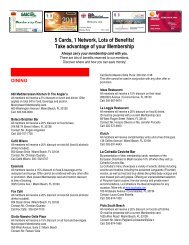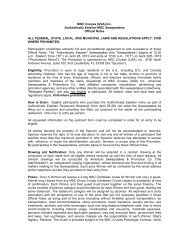italian fashion defines luxury - Italy-America Chamber of Commerce ...
italian fashion defines luxury - Italy-America Chamber of Commerce ...
italian fashion defines luxury - Italy-America Chamber of Commerce ...
Create successful ePaper yourself
Turn your PDF publications into a flip-book with our unique Google optimized e-Paper software.
BUSINESS<br />
Health Care Reform in the United States<br />
with medical conditions and who need to move from one state to another can<br />
be denied insurance on the basis <strong>of</strong> what is called a “pre-existing condition.”<br />
Within this context, there is no question that health care reform in the<br />
United States appears overdue, and the quest for reform has become a top<br />
priority <strong>of</strong> the Obama administration. On November 7, 2009, the House <strong>of</strong><br />
Representatives passed by a vote <strong>of</strong> 220-215 H.R. 3962, the Affordable Health<br />
Care for <strong>America</strong> Act, a bill to provide affordable, quality health care for all<br />
<strong>America</strong>ns and reduce the growth in health care spending. On December 24,<br />
2009 the Senate passed its own bill. The proposed legislation from the House<br />
<strong>of</strong> Representatives addresses 6 major domains <strong>of</strong> health care4:<br />
1. Coverage and cost – Insurance companies will no longer be able to<br />
discriminate against individuals, they will not be allowed to deny care on<br />
the basis <strong>of</strong> pre-existing conditions or <strong>of</strong> an individual health status and<br />
they will not be allowed to set annual and lifetime limits. The program will<br />
also promote a health insurance exchange, which will allow individuals and<br />
small businesses to perform comparison shopping among different private<br />
and public insurers. The development <strong>of</strong> a public health insurance option<br />
(public plan) is an important component <strong>of</strong> the health insurance exchange. In<br />
addition, a basic benefit package will be defined.<br />
2. Affordability – This is a key component <strong>of</strong> the proposed bill, and it<br />
ensures that all <strong>America</strong>ns will be able to afford health coverage. Under<br />
this component, the Medicaid program will be expanded. The current<br />
Medicaid program provides health insurance benefits to pregnant women<br />
and children under 6 with family income at or below 133% <strong>of</strong> the federal<br />
poverty level, to children ages 6 to 19 with a family income at or below the<br />
federal poverty level, to adults who take care <strong>of</strong> children under age 18, to<br />
individuals who receive Supplemental Security Income, to teenagers up to<br />
age 21 who are living on their own, and to people who are over 65, blind or<br />
disabled. Based on 2009 Federal Poverty Guidelines, a family <strong>of</strong> two would<br />
need an income less than $19,378 to qualify for Medicaid assistance, while a<br />
family <strong>of</strong> 4 would need an income less than $29,326 (133% <strong>of</strong> poverty level).<br />
The bill provides for an increase through federal funding in reimbursement<br />
rates to increase provider participation to Medicaid. The bill also provides an<br />
increase in Medicare drug benefit, and further improvement in the dedicated<br />
program for individual above 65 years <strong>of</strong> age. In addition, the plan is to<br />
provide a cap for out <strong>of</strong> pocket spending, and to provide a “sliding scale”<br />
by which credits will be allowed for those individuals who are just above the<br />
Medicaid eligibility level. According to this sliding scale, the credit will be<br />
completely phased out when family income reaches 400% <strong>of</strong> the poverty level<br />
($88,000 for a family <strong>of</strong> 4).<br />
3. Shared responsibility – Under this provision, individuals will be responsible<br />
for obtaining and maintaining health insurance, while employers will have the<br />
opportunity to either provide health insurance coverage for their employees,<br />
or to contribute funds on their behalf. The contribution will be based on 8%<br />
<strong>of</strong> payroll. Small employers, whose payroll does not exceed $500,000/year, are<br />
exempt from the employer responsibility. A penalty <strong>of</strong> 2% will then phase in at<br />
a payroll level above $500,000, and the penalty will then reach the full 8% for<br />
payrolls above $750,000.<br />
4. Prevention and Wellness – Primary and secondary prevention, particularly<br />
definita una “condizione di salute pre-esistente” alcuni pazienti che<br />
devono cambiare assicurazione sanitaria possono vedersela negata.<br />
In questo contesto, appare chiaro come una riforma del sistema<br />
sanitario fosse doverosa negli Stati Uniti, ed il motivo per cui questa<br />
sia divenuta una priorità dell’amministrazione Obama. Il 7 Novembre<br />
del 2009, la Camera dei Rappresentanti ha approvato con un voto di<br />
220 vs. 215 H.R. 3962, l’ “Affordable Health Care for <strong>America</strong> Act”,<br />
un provvedimento legislativo che mira a garantire una sistema sanitario<br />
più efficace e più accessibile, alla portata di tutti i cittadini americani e<br />
che punta a ridurre i costi della spesa sanitaria. Il 24 Dicembre del 2009<br />
anche il Senato ha approvato la propria proposta di legge. La legge<br />
proposta dalla Camera dei Rappresentanti tocca sei principali punti<br />
riguardanti il sistema sanitario:<br />
1) Copertura sanitaria e costi – Alle compagnie assicurative non<br />
sarà più consentito effettuare discriminazioni tra gli individui, di negare<br />
le cure sulla base di “condizioni pre-esistenti” o dello stato di salute<br />
dell’individuo, e di stabilire limiti annuali o sulla vita di un individuo. Il<br />
programma "Exchange" promuoverà trasparenza ed interscambio di<br />
dati informativi delle <strong>of</strong>ferte assicurative, che permetterà ad individui e<br />
piccole aziende di confrontare i vari piani assicurativi pubblici e privati<br />
all'acquisto. La possibilita’ di optare per un’assicurazione sanitaria<br />
pubblica (piano pubblico) è una componente importante di questo<br />
programma. In più, verrà definito un pacchetto base di benefici da<br />
<strong>of</strong>frire.<br />
2) Accessibilità – Questa è una componente chiave della riforma<br />
proposta, ed assicura che tutti gli americani possano permettersi una<br />
copertura sanitaria. Secondo questo principio, l’assistenza sanitaria<br />
Medicaid verra` estesa a più individui. L’attuale programma Medicaid<br />
prevede assistenza sanitaria a donne incinte e bambini al di sotto<br />
.20















